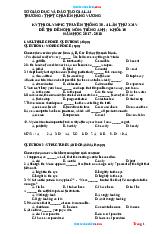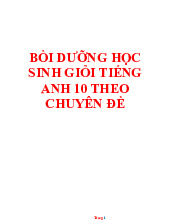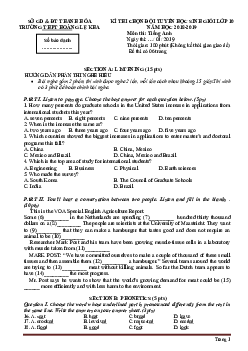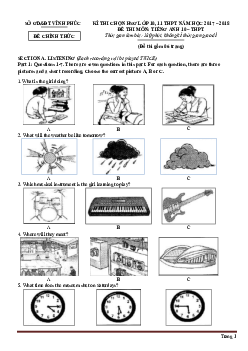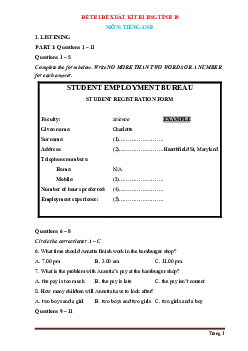














Preview text:
SỞ GD&ĐT ……….. KỲ THI CHỌN HSG VĂN HÓA LỚP 10, 11
TRƯỜNG THPT ………………. Khóa thi ngày 11 tháng 4 năm 2023 Môn thi: TIẾNG ANH 10
ĐỀ THI CHÍNH THỨC (Đề có 11 trang)
Thời gian làm bài: 180 phút, không kể thời gian giao đề
Họ và tên học sinh: Số báo danh Ngày sinh: Phòng thi số: Hội đồng thi: Họ, tên và chữ ký Họ, tên và chữ ký Mã phách GIÁM THỊ 1 GIÁM THỊ 2
(Thí sinh không viết vào ô này)
HƯỚNG DẪN THÍ SINH L ÀM BÀI:
● Thí sinh làm toàn bộ bài thi trên đề thi theo yêu cầu của từng phần. Thí sinh
phải viết câu trả lời vào phần trả lời được cho sẵn ở mỗi phần (Your answers
here). Trái với điều này, phần bài làm của thí sinh sẽ không được chấm điểm.
● Đề thi gồm có 11 trang (không kể trang phách). Thí sinh phải kiểm tra số tờ đề thi trước khi làm bài.
● Phần NGHE, mỗi Part thí sinh được nghe 2 lần.
● Thí sinh không được ký tên hoặc dùng bất cứ dấu hiệu gì để đánh dấu bài thi ngoài
việc làm bài theo yêu cầu của đề ra. Không được viết bằng mực đỏ, bút chì,
không viết hai thứ mực trên tờ giấy làm bài. Phần viết hỏng, ngoài cách dùng
thước để gạch chéo, không được tẩy xóa bằng bất kỳ cách gì khác (kể cả bút xóa
màu trắng). Trái với điều này bài thi sẽ bị loại.
● Thí sinh nên làm nháp trước rồi ghi chép cẩn thận vào phần bài làm trên đề thi.
Giám thị sẽ không phát giấy làm bài thay thế đề và giấy làm bài do thí sinh làm hỏng.
● Giám thị không giải thích gì thêm về đề thi.
_______________________________ Trang 1
PHẦN ĐỀ VÀ BÀI LÀM CỦA THÍ SINH ĐIỂM
Họ, tên và chữ ký Mã phách GIÁM KHẢO
Do chủ tịch HĐCT ghi Bằng số Bằng chữ
1………………………………
2…………………………..…..
SECTION I: LISTENING (40 points) (You will hear twice for each part)
Part 1. You will hear a woman talking on the radio about a new sport center. For each question, fill
in the missing information in the number of spaces. (10 points)
(Write NO MORE THAN THREE WORDS taken from the recording for each gap. Write your
answers in the corresponding numbered boxes). New Sports Centre
It opens on (1) _______________.
The party will be on (2) _______________.
It is opposite (3) _______________.
The car park entrance is in (4) _______________.
It costs (5) _______________ per week to be a member.
You can pay for a (6) _______________ year to save money.
You need to wear (7) _______________ and suitable clothes
A (8) _______________ is provided.
(9) _______________ are given at 5.30 each day.
Check on the (10) _______________ to get more information.
Part 2. Listen to the conversation between a caller and receptionist and choose the correct
answer by circling A, B, C or D. (10 points)
1. Which was NOT mentioned as part of the purpose of the English Language Center?
A. to help international students prepare to enter institutions of higher learning
B. to teach students how to use English at work
C. to provide work opportunities for graduating students in the community
D. to help students use English in their daily life.
2. What is one course taught at the English Language Center? A. business English B. US Culture C. TOEFL D. IELTS
3. If the Fall semester begins on August 29th, by what date should one apply to the program? A. May 29th B. June 29th C. July 29th D. April 29th
4. What is the tuition for a full-time student? A. $2013 B. $2300 C. $2030 D. $2033
5. Which one was NOT mentioned as part of the application packet a student must send to the center? A. sponsorship form B. bank statement Trang 2 C. application fee D. high school transcripts
Part 3. Listen to the record and decide if the following sentences are true (T) or false (F). (10 points)
1. The man and woman are close friends.
2. Andrew found out about his new diet through unwanted mail.
3. The cost of the Wafu Diet is $419.
4. From the conversation, we can infer that Andrew hasn’t gone running yet.
5. The woman advised the man to eat a little late at night.
Part 4: You are going to hear a lecture about the Indian railway. First, you have some time to
look at questions from 1 to 10. Now listen carefully and answer the questions from 1 to 10. (10 points)
Questions 1 – 5: Complete the sentences below. Write ONE WORD ONLY for each answer
1. Indian Railways is owned and by the government of India. 2. There are more than
million people working for Indian Railways 3. The
of the railways from 1857 occurred under Robert Maitland Brereton.
4. The joining of the East Indian Railway with the Great Indian Peninsula Railway led to a network of kilometres.
5. The route from Bombay to Calcutta, opened in 1870, was an for the book Around the World in 80 days.
Questions 6-10: Complete the table below. Write NO MORE THAN TWO WORDS for each answer Period Situation 1875 - 1899
The network radiated inward from (6) , Madras, and Calcutta
1900 - 1906 It was not long before various independent kingdoms had their own (7) .
When the war finished the railways were suffering 1907 - 1919 from (8) and
1920 - 1938 Between 1920 and 1929, the railways had a (9) of around £687 million
1939 - 1946 The rolling stock that was moved to the Middle East included locomotives and (10) Trang 3
Your answers for LISTENING TEST: PART 1: 1. 2. 3. 4. 5. 6. 7. 8. 9. 10. PART 2: 1. 2. 3. 4. 5. PART 3: 1. 2. 3. 4. 5. PART 4: 1. 2. 3. 4. 5. 6. 7. 8. 9. 10.
SECTION II: LEXICO-GRAMMAR (60 pts)
Part 1: Choose the letter A, B, C, or D to indicate the correct answer to each of the following questions. (2pts/ea)
1. The couple decided to ________some money every month for their retirement. A. put off B. put aside C. take on D. take against
2. In geometry, a tangent is a straight line ________a curve at only one point. A. it touches B. whose touching C. its touching D. that touches
3. After three days in the desert, his mind began to play ________on him. A. games B. jokes C. tricks D. fun
4. Most folk songs are ballads ________have simple words and tell simple stories. A. what B. although C. who D. that
5. Well- ___________child often behaves quite differently from one who did not get good schooling. A. education B. educated C. educate D. educating
6. When my grandfather was alive, he ________ morning exercises. A. used to do B. use to do C. used to doing D. wasn't used to do
7. There is no __________ explanation for what happened. A. scientifically B. scientist C. science D. scientific
8. A: “Do you know how old I am?” - B: “_______ .”
A. Happy birthday B. I couldn’t help it
C. Don’t mention it D. I haven’t a clue
9. By the end of this month I _______ at this school for two years. A. have been studying B. will study C. will have been studying D. will be studying
10. I could not _____ the lecture at all. It was too difficult for me. Trang 4 A. make off B. take in C. get along D. hold on
11. There are __________ as many houses in this area as there used to be. A. double B. twice C. much D. a lot
12. Susan: “Do you want to watch this or the news?”
Kate: “Oh, ___________ . It’s up to you.” A. I agree
B. I couldn’t agree more C. Don’t mention it D. I am easy
13. John wasn’t at school last week. He ________.
A. must have been ill B. must be ill C. must have ill D. must to be ill
14 Please don’t _______ a word of this to anyone else, it’s highly confidential. A. speak B. breathe C. mutter D. pass
15. The more important an exam is, …………..
A. the more you’ll get nervous
B. the more nervous will you get
C. the most nervous you’ll be
D. the more nervous you’ll get
16. There is ________in my bedroom.
A. an old wooden square table B. a square wooden old table C. a wooden old square table D. an old square wooden table
17. When Bill saw my new car, he was ………… with envy. A. blue B. green C. yellow D. white
18 When I came in, the lesson .................. A. was teaching B. was taught C. was being taught D. taught
19. I ………… very well with my father now, we never have any arguments. A. go on B. carry on C. get on D. put on
20. ________an emergency arise, call 113. A. Should B. Can C. Does D. Will Your answers: 1. 2. 3. 4. 5. 6. 7. 8. 9. 10. 11. 12. 13. 14. 15. 16. 17. 18. 19. 20.
Part 2: Questions from 1 to 10. (2 points/ each)
Use the correct form of the word in brackets to complete the following sentences.
1. She was ____________gifted: as a writer and as a painter. (doubt)
2. The illiteracy rate on the island is still _____________high. (accept)
3. She found that it was difficult to handle children who__________in class. (behave)
4. A certain degree of stress seems to be ___________in modern life. (avoid)
5. We had the phone ______because we are moving tomorrow. (connect)
6. Film directors usually ask actors to _________the scene in their mind. (visual)
7. The Internet is probably one of the best __________ever. (invent)
8. Despite his __________ with that type of vehicle, he had an accident
because a cat made him crash into a tree. (familiar)
9. His latest __________ is a book of verse on the theme of relationships. (publish)
10. Even if you’re good at a game, you shouldn’t be __________. (confidence) Your answers: Trang 5 1. 2. 3. 4. 5. 6. 7. 8. 9. 10.
SECTION III. READING (60 pts)
Part 1: Read the text below and think of the word that best fits each gap. Use only ONE word in each gap. (2pts/ea)
The British are widely (1) _____ to be a very polite nation, and in (2)______ respects this is
true. An Italian journalist once commented of the British that they need (3) _____ fewer than four
―thank youǁ merely to buy a bus ticket. The first, from the bus conductor means, ―I‘m here.ǁ The
second accompanies the handing over of the money. The third, again from the conductor, (4) ____
―Here is your ticket.ǁ, and then the passenger utters a final one as he accepts the tickets. Such
transactions in most (5) ____ parts of the world are usually conducted in total silence. In sharp
contrast to this excessive politeness with strangers, the British are strangely lacking (6) _____ ritual
phrases for social interaction. The exhortation ―Good appetiteǁ, uttered in so (7) ______ other
languages to fellow-diners before a meal, does not exist in English. The nearest equivalent – Enjoy
your dinner! – is said only by people who will not be partaking of the meal in question. What‘s more,
the British (8) ____ happiness to their friends or acquaintances only at the start of a new year and at
(9)_____ such as birthdays, (10) _____ the Greeks routinely wish all and sundry a ―good weekǁ or a ―good monthǁ. Your answers: 1. 2. 3. 4. 5. 6. 7. 8. 9. 10.
Part 2: Read the text and choose the best answer (A, B, C, or D) to each question (2 points/ ea)
Much of the information we have today about chimpanzees comes from the long-term research
of the great conservationist Jane Goodall. Jane Goodall was born in London, England, on April 3,
1934. On her second birthday, her father gave her a toy chimpanzee named Jubilee. Jubilee was
named after a baby chimp in the London Zoo, and seemed to foretell the course Jane’s life would
take. From an early age, Jane was fascinated by animals and animal stories. By the age of 10, she was
talking about going to Africa to live among the animals there. At the time, in the early 1940S, this
was a radical idea because women did not go to Africa by themselves.
As a young woman, Jane finished school in London, attended secretarial school, and then
worked for a documentary filmmaker for a while. When a school friend invited her to visit Kenya,
she worked as a waitress until she had earned the fare to travel there by boat. She was 23 years old.
Once in Kenya, she met Dr. Louis Leakey, a famous paleontologist and anthropologist. He was
impressed with her thorough knowledge of Africa and its wildlife, and hired her to assist him and his
wife on a fossil-hunting expedition to Olduvai Gorge. Dr. Leakey soon realized that Jane was the
perfect person to complete a study he had been planning for some time. She expressed her interest in
the idea of studying animals by living in the wild with them, rather than studying dead animals through paleontology.
Dr. Leakey and Jane began planning a study of a group of chimpanzees who were living on
the shores of Lake Tanganyika in Kenya. At first, the British authorities would not approve their plan.
At the time, they thought it was too dangerous for a woman to live in the wilds of Africa alone. But
Jane’s mother, Vanne, agreed to join her so that she would not be alone. Finally, the authorities gave
Jane the clearance she needed in order to go to Africa and begin her study.
1. What is the main source of information about chimpanzees?
A. the research of Jane Goodall B. the research of some conservationists Trang 6
C Jane Goodall’s father D. recentre search
2. What does the name of the toy chimpanzée refer to?
A. Jane’s father B. her favorite toy C. a baby animal D. her close friend
3. Which of the following is NOT true about Jane? A. Jane was born in London.
B. She was interested in animals from her early age.
C. At the age of 10, she went to Africa to live with animals.
D. She wanted to live among animals.
4. What does “there” in Line 9 refer to?
A. Kenya B. Jane’s hometown C. London D. London Zoo
5. Jane could not go to Africa because
A. it was thought to be dangerous for women B. it was far away
C. no one wanted to go with her
D. Africa did not exist at that time
6. After her graduation, Jane_____________
A. was unemployed B. did not want to work
C. worked for a zoo D. worked for a filmmaker
7. Jane had to work as a waitress because she wanted to
A. have more experience B. have money to buy the fare to Kenya
C. help her parents D. meet more people
8. Dr. Louis Leakey hired her because
A. she was beautiful B. she was homeless
C. she knew a lot about Africa and its wildlife D. he was impressed by her beauty
9. What does “they” in line 15 refer to?
A. Dr. Leakey and his wife B. the British authorities
C. animals D. Jane and her mother
10. Which of the following can be the title for the reading?
A. Jubilee B. Jane’s love for toy chimpanzees
C. Jane’s love for studying animals D. Jane’s favorite animals Your answers: 1. 2. 3. 4. 5. 6. 7. 8. 9. 10.
Part 3: Read the text below and decide which answer (A, B, C or D) best fits each space. ((1 point/ ea)
Clean freshwater resources are essential for drinking, bathing, cooking, irrigation, industry,
and for plant and animal (1) _____. Unfortunately, the global supply of freshwater is (2) _____
unevenly. Chronic water shortages (3) _____ in most of Africa and drought is common over much of
the globe. The (4) _____ of most freshwater supplies - groundwater (water located below the soil
surface), reservoirs, and rivers - are under severe and (5) _____ environmental stress because of
overuse, water pollution, and ecosystem degradation. Over 95 percent of urban sewage in (6) _____
countries is (7) _____ untreated into surface waters such as rivers and harbors.
About 65 percent of the global freshwater supply is used in (8) _____ and 25 percent is used in
industry. Freshwater (9) _____ therefore requires a reduction in wasteful practices like (10) _____
irrigation, reforms in agriculture and industry, and strict pollution controls worldwide. 1. A. survive B. survived C. surviving D. survival 2. A. delivered B. distributed C. provided D. given 3. A. exist B. lie C. show D. stay 4. A. resources B. springs C. sources D. starting 5. A. increasing B. growing C. climbing D. ascending Trang 7 6. A. growing B. miserable C. poverty D. developing 7. A. recharged B. discharged C. charged D. discharging 8. A. farming B. planting C. agriculture D. growing 9. A. reservation B. conservation C. preservation D. retention 10. A. ineffective B. illogical C. irrational D. inefficient Your answers: 1. 2. 3. 4. 5. 6. 7. 8. 9. 10.
Part 4: Read the passage below and choose the best answer for each question. (2 points/ ea)
WARNING ON GLOBAL WARMING
Global warming could cause drought and possibly famine in China the source of much of
Hong Kong's food, by 2050, a new report predicts. Hong Kong could also be at risk from flooding as
sea levels rose The report recommends building sea-walls around low-lying areas such as the new
port and airport reclamations. Published by the World Wide Fund for Nature (WWF), the report,
which includes work by members of the Chinese Academy of Meteorological Sciences, uses the most
recent projections on climate change to point to a gloomy outlook for China.
By 2050 about 30 to 40 per cent of the country will experience changes in the type of
vegetation it supports, (1_with tropical and sub-tropical forest conditions shifting northward and hot
desert conditions rising in the west where currently the desert is temperate. Crop-growing areas will
expand but any benefit is expected to be negated by increased evaporation of moisture), making it too
dry to grow crops such as rice. The growing season also is expected to alter, becoming shorter in
southern and central China, the mainland's breadbasket. The rapid changes make it unlikely that plants could adapt.
"China will produce smaller crops. In the central and northern areas, and the southern part,
there will be decreased production because of water limitations," Dr. Rik Leemans, one of the authors
of the report, said during a brief visit to the territory yesterday. Famine could result because of the
demands of feeding the population - particularly if it grows - and the diminished productivity of the
land. "It looks very difficult for the world as a whole," he said.
Global warming is caused by the burning of large amounts of fossil fuels, such as coal and oil,
which release gases that trap heat in the atmosphere. World temperatures already have increased this
century by about 0.6 degrees Celsius and are projected to rise by between 1.6 degrees and 3.8 degrees by 2100.
Dr. Leemans said China's reliance on coal-fired power for its indus-trial growth did not bode
well for the world climate. "I think the political and economic powers in China are much greater than
the environ-mental powers, and [greenhouse gas emissions] could accelerate," Dr-Leemans said.
"China is not taking the problem seriously yet, although it is trying to incorporate this kind of
research to see what is going to happen."
The climate change report, which will be released tomorrow, focused on China but Mr David
Melville of WWF-Hong Kong said some of the depressing scenarios could apply to the territory.
Food supplies, for instance, could be affected by lower crop yields. "Maybe we could afford to import
food from elsewhere but you have to keep in mind that the type of changes experienced in southern
China will take place elsewhere as well," he said. Sea levels could rise as glaciers melted and the
higher temperatures expanded the size of the oceans, threatening much of developed Hong Kong
which is built on reclaimed land. Current projections are that sea levels worldwide will rise by 15 to
90 centimetres by 2100, depending on whether action is taken to reduce greenhouse gas emissions.
"Hong Kong has substantial areas built on reclaimed land and sea level rises could impact on
that, not only on Chek Lap Kok but the West Kowloon Reclamation and the Central and Western
Reclamation – the whole lot," Mr Melville said, adding that sea-walls would be needed. depleted
fresh water supplies would be another problem because increased evaporation would reduce levels. Trang 8
Mr Melville said the general outlook could be helped if Hong Kong used water less wastefully and
encouraged energy efficiency to reduce fuel-burning. He also called on the West to help China improve its efficiency. 1. What is this passage? A. a report B. a preview of a report
C. an article describing a response to a report D. an article previewing a report
2. Why does the writer add the information in square brackets in paragraph 5?
A. because the quote is from a second language user whose com mand of English is not perfect.
B. because, although they are not part of the original quote, the additional information given is
necessary to understand the statement.
C. because the writer is quoting from another source.
D. because the writer wants to emphasize the meaning of these words.
3. In paragraph 7, which point is Mr Melville NOT making?
A. suggesting that there is a potential disaster in Hong Kong
B. suggesting that reclamation areas are at risk
C. criticising current safeguards D. making a call for action
4. How would you describe the Dr. Leeman's attitude towards China?
A. mainly favourable B. critical
C. supportive in theory D. admiring
5. In paragraph 2 "negated" is closest in meaning to________. A. made ineffective B. made possible C. reduced D. paid for Your answers: 1. 2. 3. 4. 5. SECTION IV. WRITING (40 pts)
Part 1: Complete the second sentence so that it has a similar meaning to the first one. (2pts/ea)
1. It was wrong of you to be rude to Judy last night.
@ I’d rather ………………………………………………………………………………………..
2. It is not necessary for you to do the test.
@ You .................................................................................................................................... ……..
3. She prefers reading a book to watching TV.
@She would .......................................................................................................................... ……..
4. People must wear face masks when going out during the Covid-19 pandemic.
@ People are .......................................................................................................................... ……..
5. He was unable to paint the gate of his house because of the heavy rain.
@The heavy rain made. ......................................................................................................... …….
6. She never seems to succeed, even though she works hard.
@ However ………………………………………………………………………………………..
7. The only reason the party was a success was that a famous film star attended.
@ Had it not ……………………………………………………………………………………….
8. Despite Jack’s strange clothes, everybody ignored him.
@ Nobody took ……………………………………………………………………………………..
9. They tried hard so that they would pass the exam. Trang 9
@With .................................................................................................................................. ………
10. The Pacific Ocean is averagely deeper than the Atlantic.
@The average _ ..................................................................................................................... ………
Part 2: Complete the second sentence so that it has a similar meaning to the first sentence, using
the word given. Do not change the word given. (2pts/ea)
1. We feel uncomfortable in this weather. (fish)
@We feel …………………………………………………………………………in this weather.
2. The staff in that office all have great respect for their boss. (look)
@ The staff in that office ………………………………..………………………… their boss.
3 She found the photographs when she was cleaning her room. (came)
@She …………………………….………………………..…. when she was cleaning her room.
4. Tim looks nothing like his father at all. (take)
@ Tim ………………………………………………………………………. his father at all.
5. Despite knowing this place very well, I got lost. (though)
@ I got lost ……………………………………………….……………………….. very well.
Part 3: Writing (10 pts)
Some students prefer learning online instead of going to school. Other students think online
learning is not really effective. In about 250 words, write an essay to express your opinion, using
specific reasons and examples to support your opinion. (You may continue your writing on the
back page if you need more space.)
……………………………………………………………………………………………………
………………………………………………………………………………………………
……………………………………………………………………………………………………
……………………………………………………………………………………………………
………………………………………………………………………………………………………
………………………………………………………………………………………………………
………………………………………………………………………………………………………
……………………………………………………………………………………………
……………………………………………………………………………………………………
……………………………………………………………………………………………………
………………………………………………………………………………………………………
………………………………………………………………………………………………………
………………………………………………………………………………………………………
……………………………………………………………………………………………………… Trang 10
………………………………………………………………………………………………………
………………………………………………………………………………………………………
………………………………………………………………………………………………………
………………………………………………………………………………………………………
………………………………………………………………………………………………………
………………………………………………………………………………………………………
………………………………………………………………………………………………………
………………………………………………………………………………………………………
………………………………………………………………………………………………………
………………………………………………………………………………………………………
………………………………………………………………………………………………………
………………………………………………………………………………………………………
………………………………………………………………………………………………………
………………………………………………………………………………………………………
…………………………………………………..
………………………………………………………………………………………………
……………………………………………………………………………………………………
……………………………………………………………………………………………………
………………………………………………………………………………………………………
………………………………………………………………………………………………………
………………………………………………………………………………………………………
………………………………………………………………………………………………………
………………………………………………………………………………………………………
………………………………………………………………………………………………………
………………………………………………………………………………………………………
………………………………………………………………………………………………………
………………………………………………………………………………………………………
………………………………………………………………………………………………………
………………………………………………………………………………………………………
………………………………………………………………………………………………………
………………………………………………………………………………………………………
………………………………………………………………………………………………………
………………………………………………………………………………………………………
……………………………………………………………………………………………………… Trang 11
………………………………………………………………………………………………………
………………………………………………………………………………………………………
………………………………………………………………………………………………………
………………………………………………………………………………………………………
………………………………………………………………………………………………………
………………………………………………………………………………………………………
-----------------HẾT---------------------
Thí sinh không được sử dụng tài liệu . Cán bộ coi thi không giải thích gì thêm.
KỲ THI HỌC SINH GIỎI VĂN HÓA LỚP 10 THPT
TRƯỜNG THPT …………..
Khóa ngày 11 tháng 4 năm 2023 Môn thi: TIẾNG ANH HƯỚNG DẪN CHẤM
SECTION I: LISTENING (40 points) Part 1: (1pt/ ea)
1. 12th/ 12/ twelfth 2. Saturday 14th 3. station 4. Fortescue 5. 9.50 (of) May May 6. whole 7. trainers 8. towel
9. dance classes 10. website Part 2 : (2pts/ea) 1.C 2.A 3.B 4.C 5.D Part 3 : (2pts/ea) 1. F 2. T 3. F 4. T 5. F Part 4: (1pt/ea) 1. operated 2. 1.4 3. expansion 4. 6400 / 6,400 5. inspiration 6. Bombay 7. rail(way) 8. disrepair / 9. capital value 10. coaches systems
collapse (IN ANY ORDER)
SECTION II: LEXICO-GRAMMAR (60 pts)
Part 1: (2pts/ea) Your answers: 1. B 2. D 3. C 4. D 5. B Trang 12 6. A 7. D 8. D 9. C 10. B 11. B 12. D 13. A 14. B 15. D 16. D 17. B 18. C 19. C 20. A Part 2: (2 pts/ ea)
1. undoubtedly 2. unacceptably 3. misbehaved 4. unavoidable 5. disconnected 6. visualize 7. inventions 8. familiarity 9. Publication 10. Overconfident III. READING (60 pts) Part 1: (2pts/ea) 1.considered 2. some 3.no 4.means 5.other 6.in 7. many 8.wish 9.celebrations 10.while
Part 2: (2 pts/ ea) 1. A 2.C 3.C 4.A 5.A 6.D 7.B 8.C 9.B 10. C
Part 3: (1 pt/ ea) 1.D 2.B 3.A 4.C 5.A 6.D 7.B 8.A 9.B 10.D Part 4: (2 pts/ ea) 1.D 2.B 3.C 4.B 5.A IV. WRITING (40 pts) Part 1: (2pts/ea)
1. I’d rather you hadn’t been rude to Judy last night.
2. You don’t have to/ need to do the test.
3. She would rather read book than watch TV
4. People are essential to wear face masks when going out during the Covid-19 pandemic.
5. The heavy rain made him unable to paint the gate of his house.
6. However hard she works, she never seems to succeed.
7. Had it not been for the attendance of a famous film star, the party would not have been a
success./ Had it not been for the attendance of a famous film star, the party would have been a failure.
8. Nobody took notice of Jack despite his strange clothes.
9. With a view to passing the exam, they tried hard.
10. The average depth of the Pacific Ocean is greater than that of the Atlantic. Trang 13
Part 2: Complete the second sentence so that it has a similar meaning to the first sentence, using
the word given. Do not change the word given. (2pts/ea)
1. We feel like fish out of water in this weather.
2. The staff in that office all look up to their boss.
3. She came across the photographs when she was cleaning her room
4. Tim doesn’t take after his father at all.
5. I got lost though I know this place very well.
Part 3: Writing (10 pts)
- If the contents are not relevant, the paragraph IS NOT COUNTED.
- If the contents are relevant, ASSESS in accordance with this scale: Criteria Details
Appearance (1 point) Is a solid unit with 3 parts (topic sentence, supporting sentences, concluding sentence)?
- Paragraph should be indented only in the first line.
- If Ss’ writing looks like an essay, subtract 1 point.
- Number of words is about 200-250. Less than 200 words or more
than 250 words, subtract 0.3 point. Structure (2 points)
Topic sentence: Ss must mention that they will talk about advantages or disadvantages.
- There should be 2 or 3 supporting sentences and examples or
explanations for each supporting idea.
- Concluding sentence(s): Ss can summarize the main ideas in
supporting sentences, paraphrase the topic sentence or suggest solutions.
Coherence (1 points) Topic sentence and supporting sentences must be relevant
- Examples/explanations must be relevant to the supporting idea that they support.
- If Ss’ writing has a good use of linking words => 0.5 point Unity (1 points)
- If Ss’ writing has a flexible use of unfamiliar transitional signals Trang 14 =>1 point. Grammar and
- If Ss’ writing is free of grammatical mistakes and spelling mistakes vocabulary (3 =>2 points. points)
- If Ss’ writing has a wide range of sentence patterns, wide range of
vocabulary and less common vocabulary =>3 points.
- Subtract 0.1 point for one mistake. Persuasiveness (2 The writing is convincing. points) - END - Trang 15
